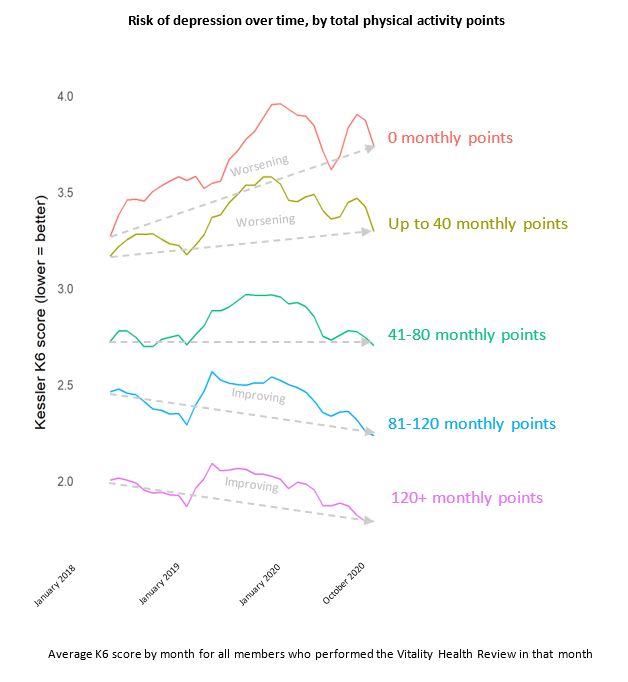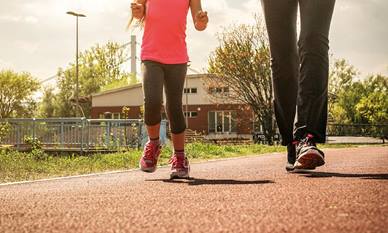What are the mental health benefits of physical activity?
Published: 30/09/2021
In the next part of our series on the benefits of physical activity, we unpack the many positive benefits of physical activity for our mental health and wellbeing, from reducing depression and improving our mood to better sleep quality.
It is widely accepted that physical exercise is good for our mental health. Whether that’s to relieve stress or just help us to feel better about ourselves. But what might be surprising is how wide-reaching these positive impacts can be.Day to day, it can improve sleep quality, while helping us to function more easily and feel better overall. But, did you know – from a clinical perspective – it can boost our cognitive skills too? This includes our ability to plan and organise at work and at home; as well as to control our emotions, improve our memory span and deliver academic performance. Research into 15 studies, involving more than 33,000 individuals, found that physical activity is associated with 38% reduced risk of cognitive decline1 - and that can include everything from the ability to concentrate to the onset of dementia.
Evidence shows that the benefits of physical activity can be felt immediately2.
For example, a single session of moderate to vigorous activity will provide a number of mental health benefits including reducing anxiety symptoms, improving sleep and improving cognition on the day that the physical activity is performed. Performing physical activity regularly will often enhance these benefits further.
Studies show that physical activity can positively impact us across four main areas.
1. Depression
Alongside more subtle benefits for our overall wellbeing, physical exercise or increased activity has been proven to help alleviate even severe forms of mental illness. According to the World Health Organisation, depression is one of the leading causes of disability, affecting more than 264 million people worldwide. Affecting anyone at any age – women more so than men – around 800,000 people die each year due to depression. Globally it is the second leading cause of death for people aged between 15-29 years old3.Physical activity has been shown to help reduce depressive symptoms for those with or without clinical depression, while lowering the risk of an individual developing clinical depression. As little as 30 minutes can bring down the likelihood of depression by more than 40%4.
2. Sleep
There is also strong evidence that moderate to vigorous physical activity improves quality of sleep in a number of ways, including reducing the amount of time it takes to fall asleep and increasing the amount of time spent in deep sleep. It can also help to reduce daytime sleepiness5. Even small amounts of physical activity can improve our quality of sleep, however how and when we exercise will affect our sleep patterns in different ways – and some of us benefit more so than others. For example, evidence suggests moderate resistance training and stretching exercise are particularly helpful to people with insomnia6.3. Mood
It might seem obvious, but physical activity can also have a positive impact on people’s mood. And there is science to prove it. One study7 asked participants to rate their mood following a period of activity, such as going for a walk, and after periods of inactivity, such as reading a book. Participants felt calmer, had more energy and felt more content, compared to those following periods of physical inactivity8. Physical activity can also be very effective in relieving stress. Highly active individuals tend to have lower stress rates compared to individuals who are less active, research has suggested9.4. Anxiety
Evidence also shows that engaging in regular exercise can help reduce symptoms of anxiety in individuals with acute symptoms of anxiety and individuals with chronic levels of anxiety10. Importantly, the benefits of engaging in physical activity can take effect immediately.Anxiety affects a large number of people every year. In 2013, there were 8.2 million cases of anxiety in the UK11. While anxiety can affect anyone at any age, in England women are almost twice as likely to be diagnosed with an anxiety disorder than men12.
Mental health during COVID-19
The recent pandemic has impacted the mental health of our nation significantly. According to a nationwide study from the Mental Health Foundation, more than half of adults and over two thirds of young people said their mental health had declined during lockdown.For those already experiencing mental health problems, some symptoms worsened during the pandemic. Additionally, many people who were not experiencing mental health problems developed mental health problems as the COVID-19 crisis took its toll13. A survey carried out by Vitality during lockdown also found that one in five members were more anxious and one in four were more stressed than in the pre-lockdown period14.
Interestingly, while over 80% of UK adults have experienced stress as a result of the pandemic, nearly 60% of those said that physical activity – specifically walking – helped them cope. The most preferred way to cope with stress was revealed to be walking15.
How do physical activity levels impact our mental wellbeing?

Read Part Two: The prevalence of physical inactivity in the UK and why it needs to change.
Coming next: How does physical activity positively impact society?
Insights for this article were taken from our report titled ‘Protective benefits of the Vitality Programme: Physical Activity’ – read the full report.
Learn more about how the Vitality Programme can benefit the health and wellbeing of your clients
Where to next?
-
Why 'physical activity' should not be confused with exercise
We explore why it is important to differentiate between categories of physical activity when it comes to encouraging clients to take steps to improve their health and wellbeing.
-
Why client mental and physical health should not be viewed in isolation
With mental health in focus more so now than ever before, a significant amount of research exists to show the relationships between physical and psychological wellbeing.
-
Insights Hub
Our Insights Hub brings you our range of adviser content - from video series to articles & blogs.
1. Physical activity and risk of cognitive decline: A meta-analysis of prospective studies.
2. CDC, Benefits of Physical Activity https://www.cdc.gov/physicalactivity/basics/pa-health/index.htm
3. Depression, World Health Organisation
4. 2018 Physical Activity Guidelines Advisory Committee Scientific Report.
5. Physical activity and risk of cognitive decline: A meta-analysis of prospective studies.
6. Brazilian Journal of Psychiatry, Effects of resistance exercise training and stretching on chronic insomina
7. Ekkeakakis et al., 2000
8. Walking in (affective) circles: Can short walks enhance affect?
9. Kuovonen et al., 2005, Job strain and leisure-time physical activity in female and male public sector employees.
10. Physical Activity Guidelines, Advisory Committee, 2018
11. The size, burden and cost of disorders of the brain in the UK.
12. Prevalence, incidence, morbidity and treatment patterns in a cohort of patients diagnosed with anxiety in UK
13. Coronavirus: Mental Health in the Pandemic
14. 335 Vitality members who answered a Daily Pulse survey on 1 June 2020
15. Mental Health in the Pandemic, Mental Health Foundation, Accessed December 2020


